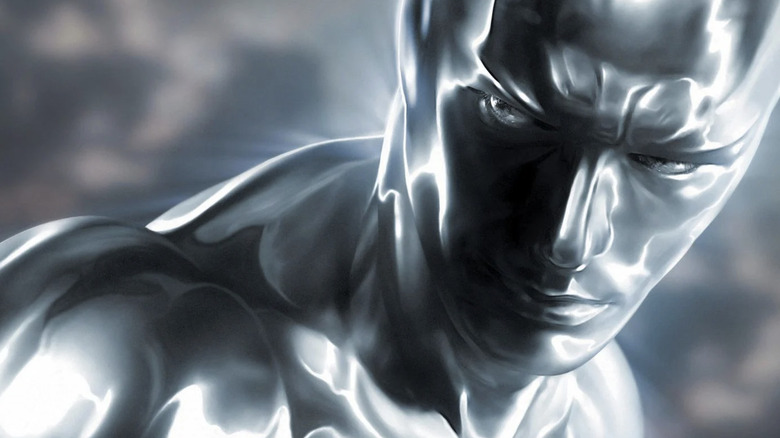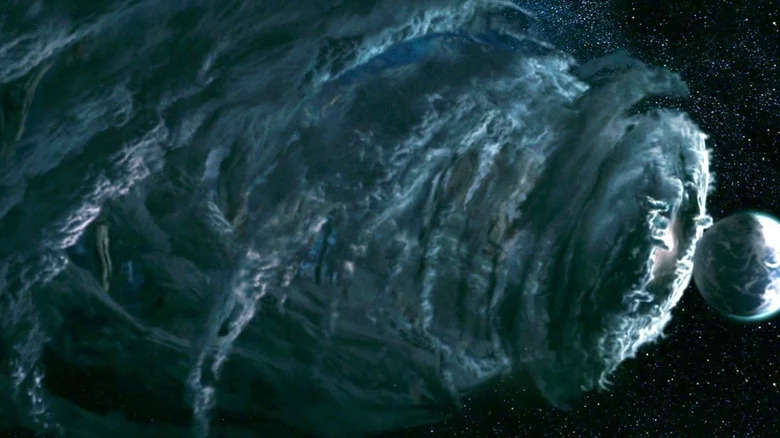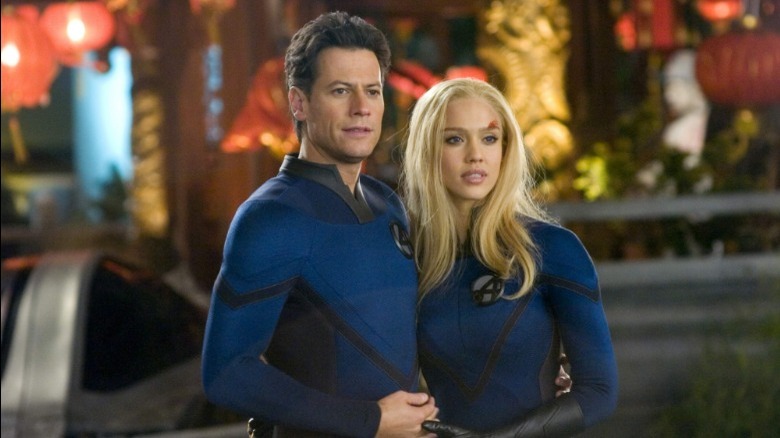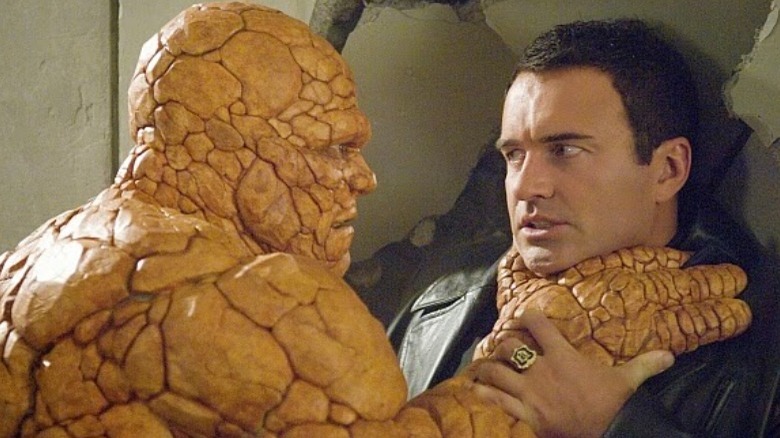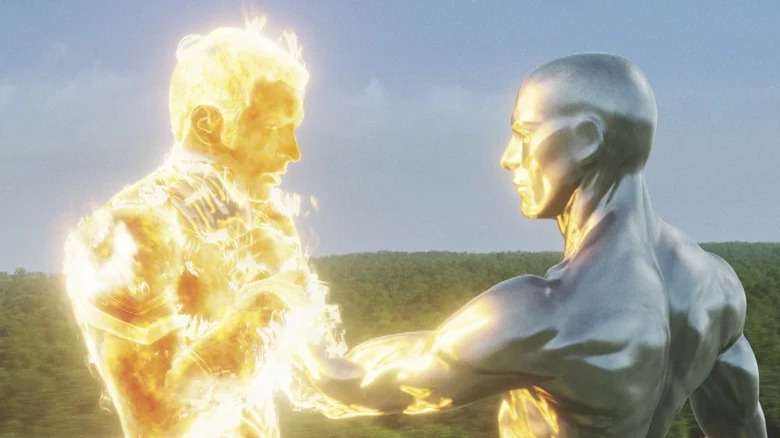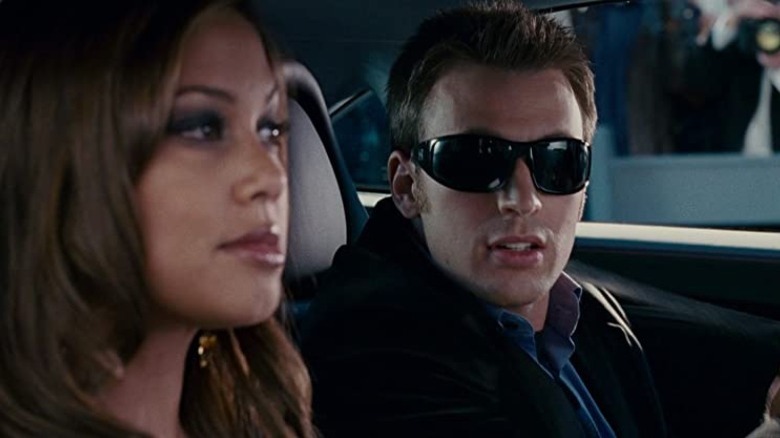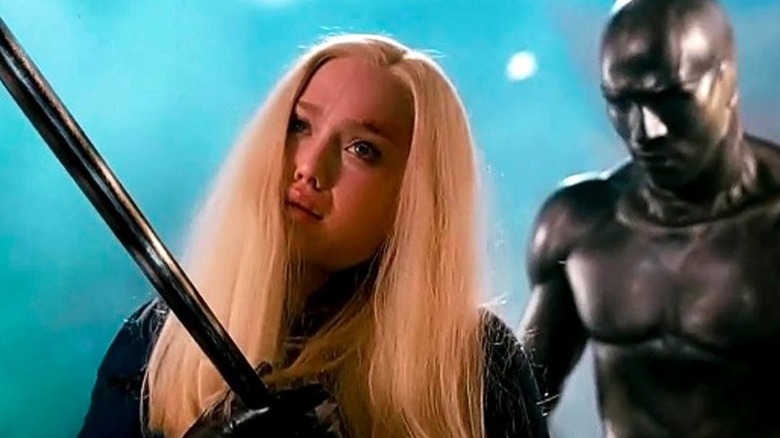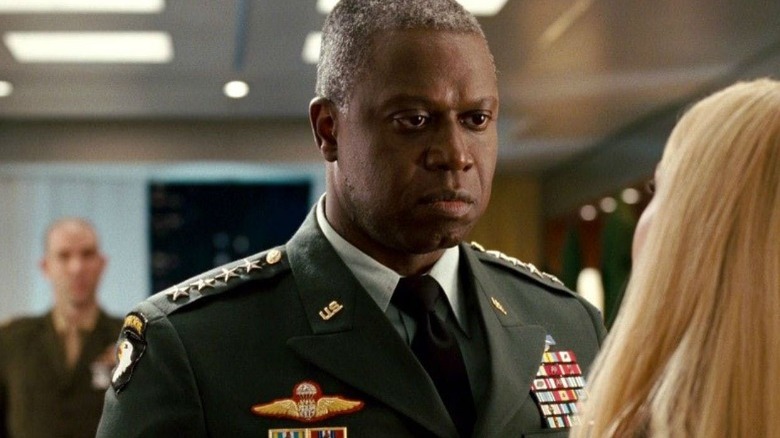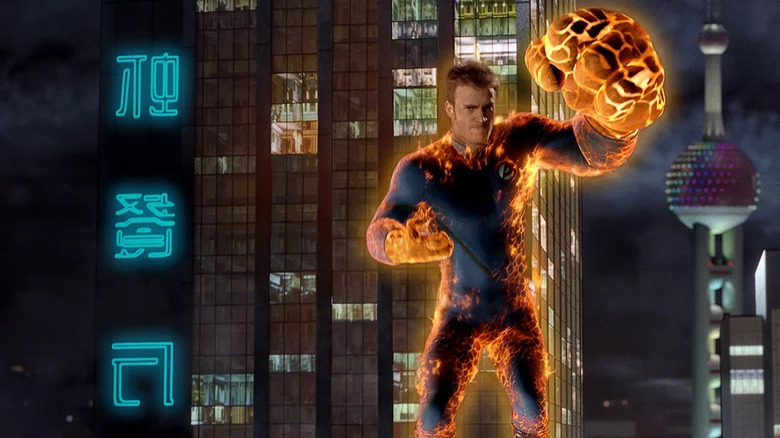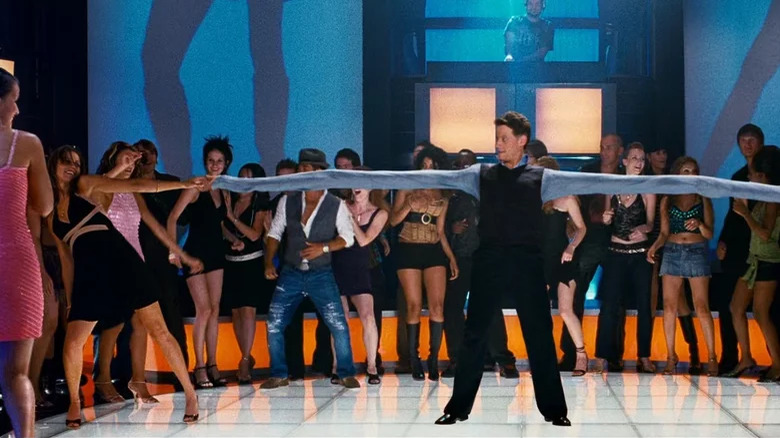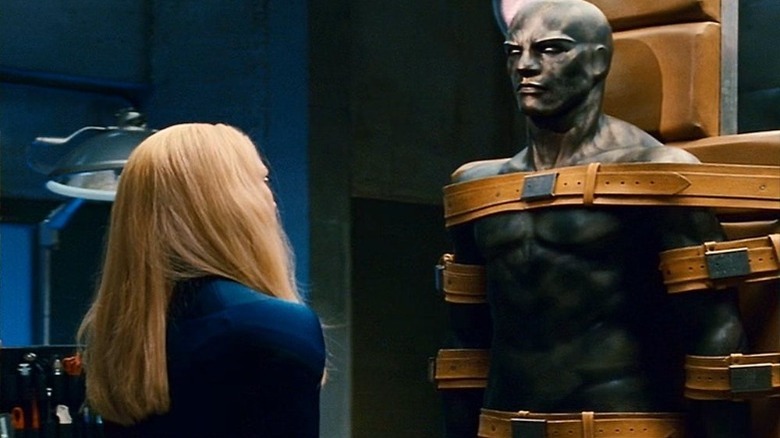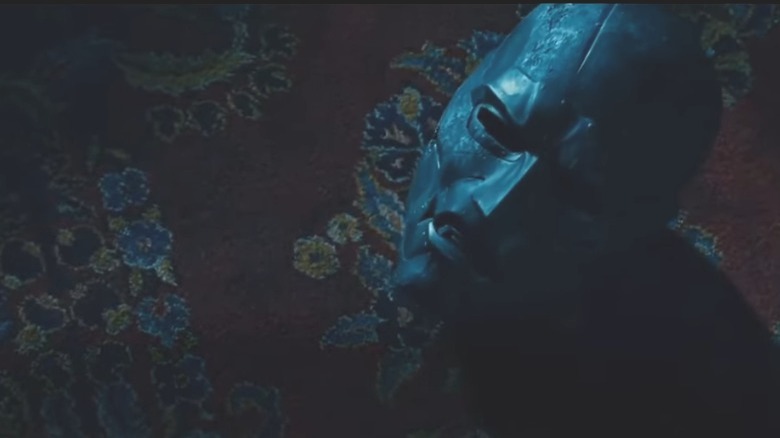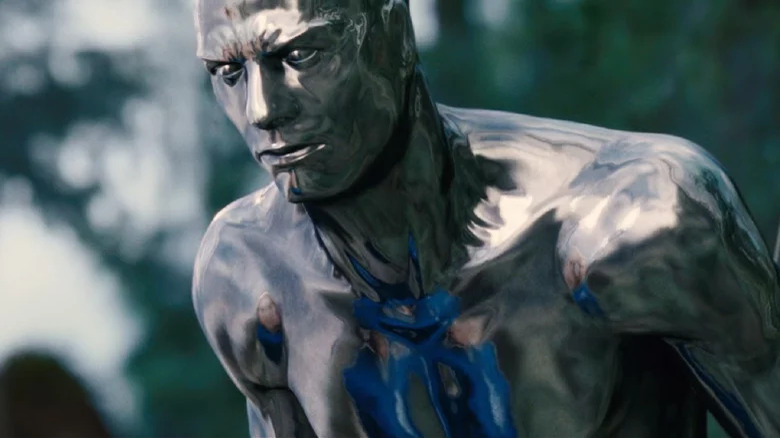The Ending Of Fantastic Four: Rise Of The Silver Surfer Explained
The second of Tim Story's "Fantastic Four" movies, 2007's "Rise of the Silver Surfer" marked a peculiar point in time for comic book movies. It was the last Marvel move released before "Iron Man" would overturn the chessboard, launching an interconnected Marvel Cinematic Universe.
With the dawn of the MCU came Marvel movies that felt uniform in terms of look, tone, and overall quality. "Silver Surfer" may have been the last Marvel production left free to be its odd, very mid-aughts snarky and goofy self.
Just like Story's 2005 "Fantastic Four" predecessor, the "Barbershop" filmmaker's sequel was drubbed by critics, only to do decent business at the box office. Years later, it certainly isn't remembered as the best non-MCU Marvel movie, but "Rise of the Silver Surfer" is imbued with enough silly, cosmic fun to harken back to what made its comic source material so beloved in the first place.
Courting the intersection of 2000s coolness and 1960s camp, "Rise of the Silver Surfer" doesn't tell the most coherent story, but it is still worth remembering for the endearing curiosity it became — as well as an ending that, well, needs some explanation.
Galactus barely puts up a fight
The strangest choice that "Fantastic Four: Rise of the Silver Surfer" makes is to include the titular Silver Surfer in all his shiny glory, but to change his boss Galactus from a giant, purple and blue-clad humanoid into a big, shapeless cloud. Galactus retains all of his planet-devouring immense power, but no trace of the colorful cosmic design given to him by creators Stan Lee and Jack Kirby. The Surfer turns out to be less of a villain than merely following orders, which leaves Galactus as a (literally) faceless villain that doesn't arrive until the end of the movie.
After all that buildup, his now-heroic silver herald flies out and defeats the big space cloud in a quick minute. There's a big flash of energy, and Galactus is easily defeated by a being that he gave power to in the first place. With no personality or backstory, Galactus is just a storm cloud of cosmic energy that ends with a whimper — instead of even a mild bang — and a few dozen mysterious holes in the Earth by which to remember him.
A normal life
If there's one thing the MCU isn't well known for, it's memorable romances. Fans of Reed Richards and Sue Storm, Marvel's most famous power couple, are undoubtedly hoping for a version in the MCU with more chemistry than Ioan Gruffudd and Jessica Alba. In "Rise of the Silver Surfer," their relationship is a central issue to the movie's plot, as their attempts at a wedding are continually interrupted (famously, part of the comic's lore), and Sue is worrying about raising a family while being publicly famous superheroes, leading Reed to promise he'll quit the world-saving business.
At the end of the movie, these concerns abruptly go away. Sue, it seems, has changed her mind — somewhere between her death and resurrection and the world's near-destruction. Just like that, she and Reed announce they're not breaking up the team, much to the delight of Johnny (Chris Evans) and Ben (Michael Chiklis), who did nothing to convince them of this course of action other than whining about it like teenagers.
Perhaps Sue was moved by the Silver Surfer (the visage of Doug Jones and voice of Laurence Fishburne) and his story of saving his world out of love? If so, she doesn't particularly bother to explain it aloud.
Dr. Doom's aimless plan
"Silver Surfer" promises an epic struggle for our heroic foursome: not only is Galactus on the way to destroy Earth, they've also got to deal with their familiar nemesis Dr. Doom (Julian McMahon), who has somehow been freed of his metallic statue prison by the Surfer's cosmic energy. Even though the Surfer rejects Doom's offer to rule the Earth together, he manages to hoodwink the U.S. military into trusting him to defeat the Surfer, and then steals the mysterious "surfboard" to make himself cosmically all-powerful.
And then what? It's completely unclear what Dr. Doom plans on doing with his new power, exactly, other than to fight the Fantastic Four when they inevitably catch up with him. He doesn't seem to have a goal, other than to just hang out and be really powerful, which is fine except he isn't accounting for the imminent arrival of Galactus to destroy all life on the planet.
Sure, it's possible Doom was confident that he'd become strong enough to defeat Galactus himself, but if so, it would behoove him to share that plan with the Fantastic Four so they could keep working together.
Cosmic plot device energy
Comic book stories often involve a fair amount of pseudoscience that more pedantic fans have to just accept; there's some sort of vague logic to it, even if it doesn't hold up to scrutiny. Spider-Man, for example, gets bitten by a radioactive spider, which is at least thematically on point. Both of the Story "Fantastic Four" movies just use the completely undefined "cosmic energy" to do whatever needs to be done at any moment, without much consistency or predictability.
Cosmic energy is what affected the team and Dr. Doom in the first movie, although each received vastly different powers. The cosmic energy of the Silver Surfer can transmute elements into different states, and it makes Johnny's molecules "unstable" so he can swap powers with people. It also heals Dr. Doom's metal problems and eventually even brings Sue back from the dead. Is it the life force itself? Is it electrical in nature?
Even the so-called "smartest man alive," Reed Richards, never manages to explain cosmic energy in any way that helps unpack its "deus ex machina"-like powers.
Johnny's busy love life
A minor subplot in "Rise of the Silver Surfer" concerns Johnny Storm's love life. In classic "opposites attract" fashion, he makes a fool of himself in front of the stoic Army Captain Frankie Raye (Beau Garrett), then she eventually accompanies him to Reed and Sue's make up wedding at the very end. Perhaps he did something in a deleted scene to convince her of a newly-found maturity?
Some viewers might recognize former "Entertainment Tonight" and "Total Request Live" host Vanessa Minnillo (now Vanessa Lachey, as in Nick's wife) in an unnamed role as Johnny's first wedding date. In just one scene, as they arrive at the wedding and both ham it up for the paparazzi together, it seems pretty clear that she's a much better match for Johnny's vainglorious, showy personality.
Sue's sacrifice
In the grand pantheon of superhero movie deaths, Sue Storm's death in "Silver Surfer" might be the least memorable of all time. At no point could any reasonable viewer think that she'll stay dead, not even for a second. Granted, deaths that don't stick are a staple of the superhero genre, but Sue's death doesn't even pay off any emotional work that the movie has put in beforehand, so it feels like nothing but a way to kill time in a climactic battle that knows what emotional beats are, but has no idea how to get there.
Perhaps with a rewrite, the audience could ascertain whether Sue's noble sacrifice is inspired by the Silver Surfer's decision to turn on Galactus. He seemed like he was already leaning that way when they were talking, and Sue does remind him of the one he loves, after all. But after getting his board back, he resurrects her almost perfunctorily, then speeds off to save the day like he never doubted he would. The scene feels so flat, uninspired and mandatory, that its "cry, and die, but still look pretty" direction nearly made Jessica Alba quit acting entirely.
The weirdly credulous U.S. Military
One fascinating aspect of "Rise of the Silver Surfer" is the complete incompetence of the United States Military in the film. This can be seen as a contrast to the MCU, which has frequently worked with the military, and predominantly avoids such characterization.
In the world of "Fantastic Four," the military is painted as a bunch of useless jocks that repeatedly get in the way of our heroes saving the world. General Hager (Andre Braugher) has a mostly-unexplained animosity for Reed Richards, and only reluctantly seeks his help in tracking the Silver Surfer's movement as the film begins.
This distaste for egghead scientists doesn't stop Hager from completely trusting Dr. Doom, however, who has been off the grid for two years after attempting to kill the Fantastic Four in the first movie. Hager seems fine with being in bed with a madman who once fired a heat-seeking missile in New York City; when Doom turns on him, he even seems surprised.
Unlike the MCU, where the armed forces seem to support the Avengers, if not finance them directly (or perhaps indirectly, through deals with Stark Industries), in "Rise of the Silver Surfer" they're useless cannon fodder.
By our powers combined
Johnny's ability to swap powers is probably the most reliably interesting part of "Rise of the Silver Surfer." A byproduct of his early run-in with the Silver Surfer, it serves as a running reminder of his reckless nature when he repeatedly forgets to not touch his teammates during key situations. But instead of this leading to some sort of character growth, it culminates in a nonsensical scene when he absorbs everyone's powers for a knock-down, drag-out fight with the also super-charged Dr. Doom.
It's visually quite fun, but opens up so many logistical questions: If he has swapped abilities every time he touched another Fantastic Four member so far, how does he still retain his fire and flight powers? How does he give Sue's powers back to her, considering that she dies (briefly) not long after he absorbs them? It doesn't seem intuitive in the first place that all four of them joining hands would produce this result; logically, they risked an unknown chain reaction that could have potentially rendered them all without powers at the most critical moment in the film.
Mr. Fantastic's fantastic dress shirt
As established in the first movie, the Fantastic Four's jumpsuits are made of "unstable molecules" that can accommodate and work with their various powers. Reed's suit stretches, Johnny's is flame resistant, and Sue's can turn invisible.
"Rise of the Silver Surfer" follows in the first movie's footsteps by inventing a reason for Jessica Alba to be naked. When Sue and Johnny accidentally switch powers, her clothes burn away. The team's regular clothes, the movie implies, are made of regular materials that can't adapt to their abilities.
This logic doesn't hold up, however, in the movie's most ridiculous scene: Reed's impromptu bachelor party. Finally prodded into dancing by Johnny, Reed dances with multiple women, taking a moment to very uncharacteristically show off, stretching his arms out. Lo and behold, the sleeves of his seemingly ordinary blue dress shirt stretch right along with him.
When Sue arrives at the nightclub, she focuses her vitriol on him dancing with other women, but buries the lede: Reed's apparently been hoarding unstable molecules to make special dress shirts for himself. Either that, or it's just another inconsistency the filmmakers couldn't be bothered to think out.
Enhanced Interrogation Techniques
The military in "Rise of the Silver Surfer" seems to exist only to make the heroes look good. Not only are they incompetent, they're downright brazenly unethical.
When they capture the Silver Surfer, for instance, they immediately cut the Fantastic Four out of the process and begin torturing him. With glee, they even point out that since the Surfer isn't a human being, the Geneva Conventions don't apply. It's not even clear if they're privy to what Sue and the team have discovered about the imminent threat of Galactus; they just resort immediately to torture.
No one mentions that this is technically "first contact" with an alien race. Has the president been informed? Is there anyone involved that outranks General Hager?
As a final, perplexing bit of fantasy, the military takes the Surfer to some sort of off-books black site in Siberia — which implies a mutual collaboration with Russia, of all countries. All this shadowy menace can't help but make viewers root for Sue, who has to use her powers to sneak into the room to try the comparatively brilliant tactic of simply talking to the guy.
What happened to Dr. Doom?
Part of what makes the conclusion of "Fantastic Four: Rise of the Silver Surfer" fall flat is its lack of catharsis. Other than boilerplate saving the world stuff, there's not much satisfaction in the defeat of Galactus, since Galactus doesn't have any lines, personality, or even a face.
You'd think, perhaps, that this must be why the Fantastic Four's more traditional nemesis, Dr. Doom, has also returned to haunt them. Surely, they'll work together as a team to take down their arch-rival?
Nope. Instead, an extra-souped-up Johnny takes out Doom with a mild assist from Ben operating a crane. The last we see of Doom, he's rather unceremoniously plunging into a lake, not to be seen again. He doesn't even get a good "you haven't seen the last of me!" in there, before he abruptly splashes out of the story. Dr. Doom doubtlessly would have returned to haunt his least favorite super team in a hypothetical third movie, but "Fantastic Four" is one of history's many movie trilogies that will never be completed. Latveria's grumpiest citizen, unfortunately, shall never have his revenge.
The rise, fall, and re-rise of the Silver Surfer
In the end, the biggest misstep that the movie makes is right there in the subtitle. Why is this movie called "Fantastic Four: Rise of the Silver Surfer"? It's catchy, and definitely something that Stan Lee would have written back in the day, but the Surfer himself doesn't notable "rise" in the movie. He's more or less all-powerful during the entire run of the movie: he shows up with the ability to cause mass blackouts and turn rivers to stone, and ends the movie by destroying Galactus himself. The brief summation we get of his origin story isn't a "rise," either, so much as a fall since he was ransomed into service in the first place to save his planet.
A mid-credits scene reveals that not only did the Silver Surfer handily defeat the very cosmic being that gave him his power to begin with, he and his board survived the encounter without a visible scratch. One hopes that he'll surf off to be reunited with his lost love on his now safe-from-destruction home planet, although it isn't clear how much time has passed. One also hopes it doesn't occur to him that he could have just turned on Galactus at any point, because he'll have to reckon with how many innocent stars and planets he watched die in the meantime.
